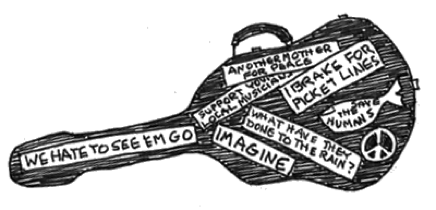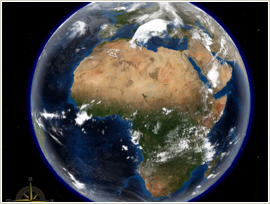


When
my mother was writing her newsletter, Sporadic Times, she would often
put in a household hint or a recipe. This was nothing new; when she was
working for the People’s World in the thirties and forties she did a
household column. So today a quick lunch idea I discovered when I was
trying a no-gluten diet for arthritis: Fry up a hot dog, heat up a corn
tortilla, wrap hot dog in tortilla and eat. Not as tasty as a really
good corn dog, but better than the 98% of corn dogs that are really bad.
So yesterday I was sitting on the front steps eating one of these with a
couple of celery sticks and thinking that I was thankful to the Mexican
Indians of ancient days who domesticated corn. This was before the
Aztecs, of course, but I got caught up in the alphabet thing. PS: the
diet didn’t work for me.
So here’s the Zulu part:
Bruce
Hayden was wearing a great shirt at FAR-West, saturated teal cotton
with full sleeves and lace-up neck. I wanted one. He said he had looked
online for Renaissance shirts with no luck, then somebody said “Look for
pirate shirts.” So I went home and did that, but I didn’t find one as
good as his (he’s going to look for the site for me). I did, however,
find a sea song index site (URL) with this quote:
"...I
soon got used to this singing, for the sailors never touched a rope
without it. Sometimes, when no one happened to strike up, and the
pulling, whatever it might be, did not seem to be getting forward very
well, the mate would always say, 'Come men, can't any of you sing? Sing
now and raise the dead.' And then some one of them would begin, and if
every man's arms were as much relieved as mine by the song, and he could
pull as much better as I did, with such a cheering accompaniment, I am
sure the song was well worth the breath expended on it. It is a great
thing in a sailor to know how to sing well, for he gets a great name by
it from the officers, and a good deal of popularity among his shipmates.
Some sea captains, before shipping a man, always ask him whether he can
sing out at a rope."
-Herman Melville, Redburn, chapter 9 (1849)
Malvina tried to write an autobiography but it kept turning into a journal. On page 22, she says:
I
don’t look back willingly into my own life. My husband Bud liked to go
back and visit the people we knew when we lived in Long Beach; he kept
up connections with people whose lives had moved away from ours. Even
when they had rejected the progressive movement, disillusioned,
comfortable in the system or both, he still wrestled with their souls,
though we had both agreed that lilies that fester smell far worse than
weeds.
I have learned how to reach people now, and I have no time for
the past and its people, who are less to me than the long-haired boy I
pass on the street who smiles at me, or the girl in fantastic clothes
with the odd face. Odd faces are in fashion now. Bud says, “Who is
that?” I laugh and say, “I haven’t the foggiest notion I just smiled and
he smiled back. That’s the way now.”
It would be hard for me to have described for Bud the nature of
that smile--as though the boy and girl and I were citizens of a very
special world and had a password unspoken.
I have time only for today and tomorrow. Such tomorrow as there
is for me and the kids, who could be beautiful people in a fine world,
if they had the chance.
There is a formula for this chance.
I’ve been over it so often in my mind that it is now a simple symbol, like sigma or that. To break it back into words is a big job. [Here she wrote “That’s the job of this book” and then crossed it out.]
It starts with a few sentences from another woman, a woman born,
like me, at the turn of the century. She is Margaret Schlauch, the
philologist. . . .
In 1942, she published a book, “The Gift of Tongues,” and a few
lines from the first chapter gave me what I needed in addition to
Marxism, my key to humankind and the world.
“Speech and work together have made us men.”*
And a little farther on, “Language as communication implies
community of living. A symbol is not a symbol--that is to say, it is not
effective--unless it is understood in approximately the same way by a
group of people living and working together. . .
“. . .songs and chants used while work is performed tend to merge
a man’s ego in social activity. Tribal dances accompanied by song are
also said to reduce a person’s awareness of himself. . . .It is perhaps
unfortunate that modern urban men, working so often in silent isolation
and amusing themselves in an individualistic manner, are prevented from
enjoying this salutary experience. If it is language that has made us
men, we forget at our own cost that language is impossible without
communal living.”
I wrote to Margaret Schlauch...I have her letter of March 14,
1968. I wanted to tell her what a revelation her philosophy was to
me--the cornerstone of my thinking. She seemed surprised that I found it
unique. She said “The same point has been make by many scholars in the
fields of anthropology and linguistics.”
Malvina wrote a little poem/essay on this subject, “The Soul Book”
which conveys her philosophy of community better than anything she
wrote in her autobiography. Tracking down something else entirely, I
came across a Zulu word that, if my mother had known of its existence,
she might have chosen to represent that. It is ubuntu. According to Wikipedia,
“Ubuntu is an ethic or humanist philosophy focusing on people's
allegiances and relations with each other. The word has its origin in
the Bantu languages of southern Africa. Ubuntu is seen as a classical African concept.”
Ellen
Stekert kept noting in the margins of the autobiography that my mother,
when she was writing about some personal problem, would leave it and go
off into critiquing society. But I do think in this case the lack is in
our society but present in Zulu society, of a word for the
interconnectedness that makes us human.
Archbishop Desmond Tutu further explained Ubuntu as follows (2008):
“One
of the sayings in our country is Ubuntu - the essence of being human.
Ubuntu speaks particularly about the fact that you can't exist as a
human being in isolation. It speaks about our interconnectedness. You
can't be human all by yourself, and when you have this quality - Ubuntu -
you are known for your generosity.
We
think of ourselves far too frequently as just individuals, separated
from one another, whereas you are connected and what you do affects the
whole world. When you do well, it spreads out; it is for the whole of
humanity.”
So if my mother had studied Zulu instead of Anglo-Saxon in graduate school, she might not have been at a loss for words.
I am also thankful for Rebecca Solnit, my favorite deep thinker, for her surprisingly hopeful take on the twenty years since the fall of the Berlin Wall.
And thankful to ten-year-old Will Phillips
who refuses to say the Pledge of Allegiance in school because there
isn’t “liberty and justice for all.” He doesn’t think there is liberty
and justice for gay people, and he’s getting flack from some of his
peers for his views. Thank you also to Mara for posting this on Facebook
with the address of Will’s school, West Fork Elementary School, 359
School Avenue, West Fork, AR 72774. Let’s write and tell him how proud
of him we are.
______________________________________
* Margaret
Schlauch: The gift of tongues. Modern Age Books. New York, 1942. pp
11-12. Note use of “man” as equivalent of “humankind” [Malvina’s
footnote]
©2009 by Nancy Schimmel
Nancy Schimmel
Thanksgiving
with friends, got a new household hint. They kept the stuffed acorn
squash warm with a space blanket from a wilderness survival kit while we
were eating the roasted brussels sprout soup and the oven was busy
baking dessert.
Friday, November 27, 2009 - 10:24 AM


Wednesday, November 25, 2009


THANKFUL FOR AZTECS AND ZULUS
AND EVERYBODY IN BETWEEN






